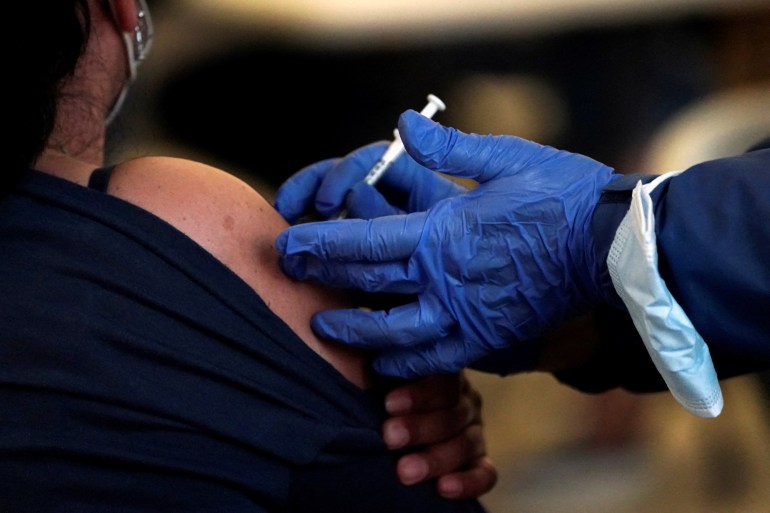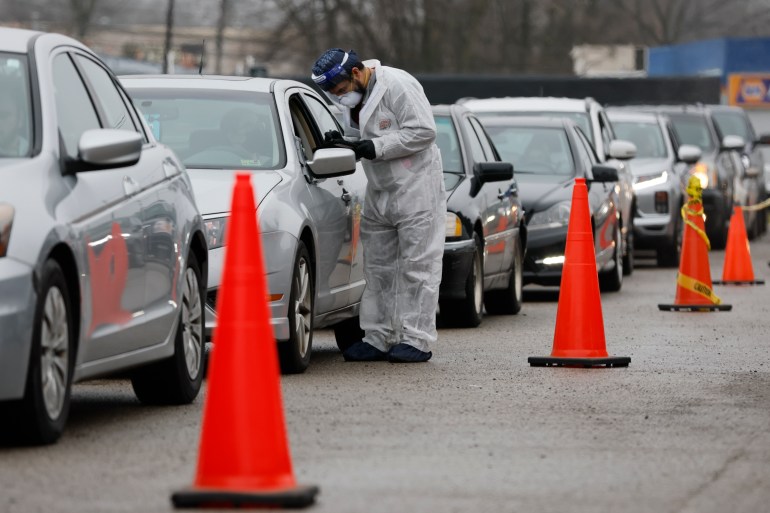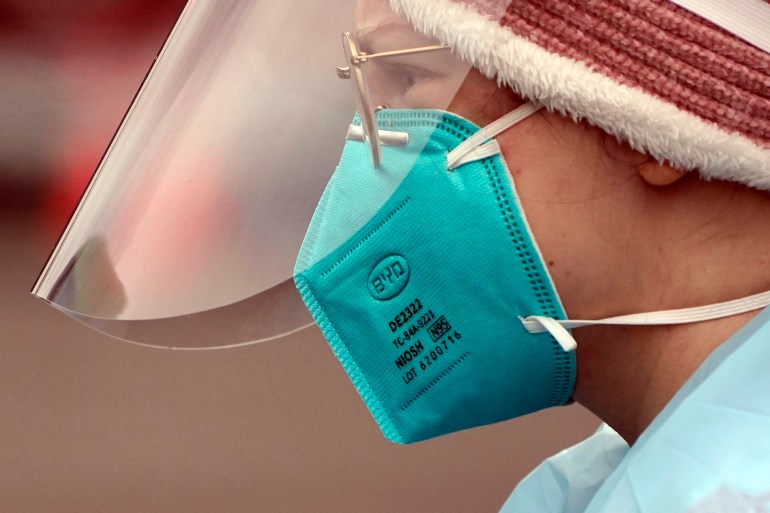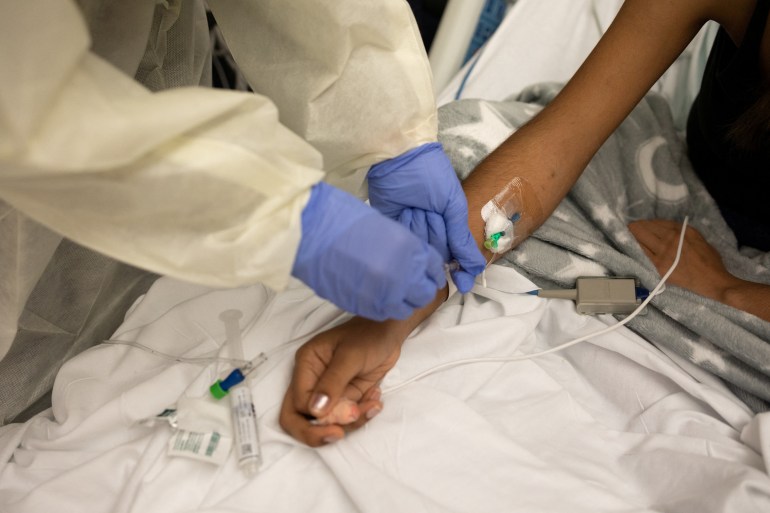Victims’ families say they are still grappling with deep pain as US President Joe Biden vows to keep fighting the coronavirus.
By Jihan Abdalla
Washington, DC – Sabila Khan says she is frustrated and tired.
She lost her father, Shaqat Khan, to the coronavirus in 2020, and feels disappointed by what she says is an overwhelming push to “normalise” the pandemic in the United States, despite rising cases and deaths due to the Omicron variant.
“I still haven’t come to terms with it,” says Khan, a 42-year-old publisher in New York City, explaining that losing a loved one to COVID-19 is uniquely painful because restrictions on visitations and funerals have meant she did not have closure.
“I’m in therapy … My PTSD is a lot better than it was. I still have nightmares and night terrors,” Khan tells Al Jazeera.
The coronavirus pandemic has claimed more lives in the US than anywhere else in the world, highlighting deep political divisions in American society, as well as heaping immense physical and emotional pain on millions of Americans.
President Joe Biden took office a year ago as cases and deaths linked to COVID-19 were soaring across the US and vaccines were in short supply. Now, on the one-year anniversary of his presidency, the Democratic leader is promising that his administration will continue to tackle the virus – and move the country “toward a time where COVID-19 won’t disrupt our daily lives”.

But for people who lost relatives and friends to the virus, frustrations are still running high.
“I had higher hopes for this administration taking charge of this situation and obviously we are at a better place,” said Khan, who oversees a Facebook support group that is dedicated to those who lost relatives to COVID-19 and that is getting 200 new members every week. “But I think that the Biden administration was really quick in putting all of its eggs in the vaccine basket.”
Biden administration efforts
On Wednesday, Biden acknowledged that the coronavirus has inflicted pain on Americans. But he touted the number of Americans who are now vaccinated – nearly 210 million – and the nation’s testing capacity, and he said the US would not go back to lockdowns.
“For many of us, it’s been too much to bear,” Biden said during a news conference at the White House on the eve of his presidency’s official one-year mark on Thursday. “We’re in a very different place now, though; we have the tools, vaccines, boosters, masks, tests, pills.”
On Biden’s inauguration day last year, cases and deaths linked to COVID-19 were soaring in the US and vaccines were still in short supply.
The ceremony, held on a cold, blustery morning in Washington, DC, was devoid of the traditional large crowds and parades due to nationwide restrictions on large gatherings. At the time, Biden pledged to tackle the coronavirus pandemic head-on, get Americans vaccinated, reduce the infection rate and reopen schools and businesses.

By late June, cases appeared to be receding amid rising vaccination rates. Schools reopened, and the economy began to slowly recover. But the Delta variant soon arrived, followed by Omicron – a highly transmissible variant that set new daily caseload records and once again inundated healthcare facilities nationwide.
During the holiday season late last year, the Biden administration came under criticism over the lack of at-home tests and long queues at testing sites. On Wednesday, Biden said his administration should have done more to ramp up testing.
“Should we have done more testing earlier? Yes. But we’re doing more now,” he said. The White House this week launched a website through which Americans can order test kits to be delivered to their homes. Biden said a total of one billion tests would be available.
Communication and trust building
Public health experts say the Biden administration so far has been effective at making vaccines available to Americans and reducing disparities in access among historically disadvantaged communities. The US produces and has authorised the use of three vaccines: Pfizer-BioNTech, Moderna and Johnson & Johnson.
Nearly 75 percent of adults in the US are now fully vaccinated, according to US Centers for Disease Control and Prevention (CDC) data, and more than 40 percent have received booster shots. In recent months, the administration has also made headway in vaccinating children.
What the administration has done less effectively, said Michael Wilkes, a professor of medicine and global health at the University of California, Davis, is communicating health guidance to the public and building trust.
“There’s been many areas where the data has been changing,” Wilkes told Al Jazeera. “Rather than communicate the uncertainty to begin with, the CDC was a bit arrogant and said this is the way it should be.”

He pointed to the CDC recommending earlier this week that the public use cloth masks, but then the following day, as additional studies emerged, abruptly adjusting the recommendation to say people should use N95 and KN95 masks for better protection.
Late last year, the CDC also halved the recommended quarantine time for people who contract COVID-19 but are asymptomatic, from 10 to five days. The recommendation drew rebuke, as well as mockery on social media, as users created memes that predicted what the CDC would recommend next.
According to a CBS News/YouGov poll published on Monday, 57 percent of respondents said coronavirus information from officials was “confusing”.
Vaccine ‘holdouts’
The unrelenting force of the pandemic has also taken a toll on Biden’s popularity 12 months into his presidency. Forty-five percent of Americans said they approve of Biden’s handling of the pandemic, down from 57 percent a month ago, according to an Associated Press-NORC Center for Public Affairs Research poll released on Thursday.
According to the CDC, as of January 17, an average of 1,850 Americans were dying daily due to COVID-19. In total, the disease has claimed the lives of more than 858,000 people in the US since the pandemic began, according to a tally kept by Johns Hopkins University, while more than 68.6 million cases have been reported.
Health experts say the death toll in the US will continue to rise, especially amid a sizeable population of Americans who remain unvaccinated due to misinformation about COVID-19 and the vaccine, as well as political and religious beliefs. Tens of millions of American adults remain unvaccinated.
“I don’t know of anyone who developed serious illness due to COVID who is vaccinated,” said Dr Nate Link, chief medical officer at Bellevue Hospital in New York City.

He said that although New York has one of the highest vaccination rates in the country, the state’s vaccination “holdouts” are driving the majority of hospitalisations and straining resources and staff.
“There’s no question each wave piles up on the last, so the staff burnout continues to grow and it gets harder and harder to manage each subsequent wave,” Link told Al Jazeera.
Biden’s attempts to impose vaccine mandates have been met with stiff resistance from Republican leaders. His effort to require employees at large businesses to be vaccinated against COVID-19 or undergo weekly testing was blocked by the nation’s highest court this month.
For Khan, the US’s continued push to stay open and remove COVID-19 restrictions – in spite of rising cases – is an affront to her suffering.
“People want to get on with it and we are not there yet and I feel like it’s further minimising our pain,” she says. “I feel constantly gaslighted by our administration, by people in our communities in a way that I didn’t really feel last year.
“There is a dangerous narrative at play that Omicron is mild, but people are still dying.”
SOURCE: AL JAZEERA


